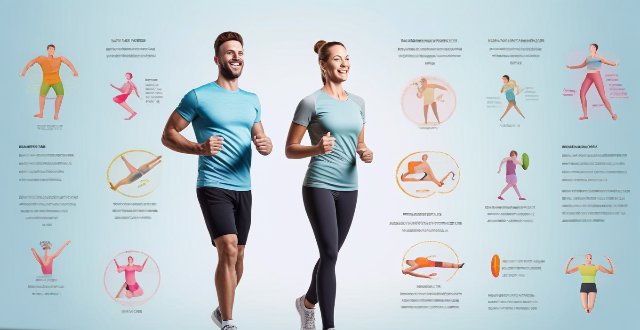Exercise Bones

Can exercise prevent osteoporosis ?
Exercise plays a crucial role in maintaining healthy bones by increasing bone density and strength. Effective exercises for preventing osteoporosis include weight-bearing exercises, strength training, balance exercises, high-impact exercises, and flexibility exercises. Incorporating these exercises into your routine can help reduce the risk of osteoporosis and maintain strong bones throughout your life.

How does exercise contribute to bone health ?
Exercise contributes to bone health by increasing bone density, improving balance and coordination, strengthening muscles, improving posture, reducing inflammation, and enhancing cardiovascular health. This reduces the risk of osteoporosis, fractures, back pain, and other health issues.

Is weight-bearing exercise really necessary for bone health ?
Weight-bearing exercises are often recommended for maintaining bone health, but is it really necessary? Let's explore this topic in detail. Weight-bearing exercises include any activity that requires you to carry your own body weight, such as walking, jogging, dancing, climbing stairs, and weightlifting. These exercises can help strengthen bones and muscles, improve balance and coordination, and reduce the risk of falls. Maintaining healthy bones is crucial for overall health and well-being. Strong bones provide support and protection for your body, allowing you to move with ease and perform daily activities without pain or discomfort. Additionally, having strong bones can help prevent fractures and other injuries. Weight-bearing exercises have numerous benefits on bone health, including stimulating bone growth, improving bone density, reducing the risk of falls and injuries, and promoting overall health and well-being. However, there are some alternatives to weight-bearing exercise that may be beneficial for people who cannot engage in these types of activities. These include resistance training, yoga or Pilates, and swimming. In conclusion, weight-bearing exercises are highly recommended for maintaining bone health due to their numerous benefits on bone growth, density, and overall health and well-being. However, there are alternative exercises that may be beneficial for people who cannot engage in weight-bearing activities. It's always best to consult with a healthcare professional before starting any new exercise program.

How often should I exercise to maintain good bone health ?
Exercise is crucial for maintaining good bone health, but the frequency and intensity required vary depending on individual factors. Regular exercise strengthens bones, improves balance, and reduces the risk of falls and fractures. The recommended exercise guidelines for adults are at least 150 minutes of moderate-intensity aerobic exercise per week and two or more days of strength training per week. For older adults, it's important to consult with a healthcare professional before starting any new exercise program. Other factors that impact bone health include diet, smoking, and overall health status.

What types of exercises are best for improving bone density ?
Improving bone density is crucial for maintaining overall health and preventing conditions such as osteoporosis. Engaging in specific types of exercises can significantly enhance bone density, making them an essential component of a healthy lifestyle. Here are some of the best exercises for improving bone density: 1. **Weight-Bearing Exercises**: These activities put stress on the bones, which stimulates them to grow stronger. Examples include walking, jogging, stair climbing, and strength training. 2. **High-Impact Exercises**: These exercises involve jumping or quick, forceful movements that create a significant impact on the bones. Examples include jumping jacks, burpees, box jumps, and plyometrics. 3. **Resistance Training**: This type of training involves using external resistance, such as weights or resistance machines, to challenge the muscles and bones. Key exercises include squats, deadlifts, bench press, and rows. 4. **Isometric Exercises**: While not as directly beneficial for bone density as the previous categories, isometric exercises can still play a role in maintaining and improving overall strength, which contributes to better bone health. Examples include planks, wall sits, and push-up holds. Incorporating a combination of these exercises into your routine can significantly improve bone density over time. It's essential to consult with a healthcare professional before starting any new exercise program, especially if you have pre-existing health conditions or concerns about your bone health.

How does exercise affect bone remodeling ?
Exercise is crucial for maintaining bone health by stimulating bone remodeling, a continuous process of breaking down and rebuilding bones. This process is essential for maintaining bone density and strength, preventing osteoporosis, and other bone-related diseases. Regular exercise increases the activity of osteoblasts and reduces the activity of osteoclasts, leading to improved bone density and strength. Weight-bearing exercises, resistance training, balance exercises, and high-intensity interval training are effective ways to maintain bone health.

Can people with osteoporosis still do exercise safely ?
Osteoporosis is a condition characterized by low bone mass and deterioration of bone tissue, leading to brittle bones that are prone to fractures. It is a common concern among older adults, especially women. While exercise is generally recommended for maintaining overall health, it is important to consider the safety of physical activity for individuals with osteoporosis. In this article, we will explore whether people with osteoporosis can still do exercise safely and what precautions should be taken. Is Exercise Safe for People with Osteoporosis? Benefits of Exercise for Osteoporosis: - Improved Bone Density: Regular weight-bearing exercises can help improve bone density in individuals with osteoporosis. - Increased Strength and Balance: Resistance training and balance exercises can enhance muscle strength and reduce the risk of falls. - Better Quality of Life: Engaging in physical activities can improve mood, reduce pain, and enhance overall well-being. Risks Associated with Exercise for Osteoporosis: - Fracture Risk: High-impact activities or excessive force during exercise may increase the risk of fractures in people with osteoporosis. - Joint Stress: Some exercises may put excessive stress on joints, potentially leading to joint pain or damage. Safe Exercises for People with Osteoporosis: Weight-Bearing Exercises: - Walking: A low-impact activity that can help maintain bone density. - Dancing: A fun way to engage in weight-bearing exercise while also improving balance. Resistance Training: - Light Weight Lifting: Using light weights or resistance bands can strengthen muscles without putting too much strain on bones. - Bodyweight Exercises: Squats, lunges, and step-ups can be modified to suit individual abilities and provide resistance training benefits. Flexibility and Balance Exercises: - Tai Chi: A gentle form of exercise that focuses on slow, flowing movements to improve balance and flexibility. - Yoga: Certain yoga poses can help enhance flexibility, balance, and strength, but it is essential to avoid high-impact or bending poses that may increase fracture risk. Precautions to Take During Exercise: 1. Consult with a Healthcare Professional: Before starting any exercise program, it is crucial to consult with a healthcare professional who can assess your individual needs and risks. 2. Start Slowly: Begin with low-intensity exercises and gradually increase the duration and intensity as your body adapts. 3. Use Proper Technique: Ensure proper alignment and technique during exercises to minimize the risk of injury. 4. Wear Appropriate Footwear: Choose shoes with good support and cushioning to reduce the impact on joints and bones. 5. Avoid High-Impact Activities: Steer clear of activities like jumping or running that may increase the risk of fractures. 6. Listen to Your Body: If you experience pain or discomfort during exercise, stop immediately and seek advice from a healthcare professional. 7. Incorporate Rest Days: Allow your body time to recover between exercise sessions by including rest days in your routine.

Can resistance training help improve bone density in older adults ?
Resistance training has been shown to have a positive impact on improving bone density in older adults. This form of exercise strengthens the muscles and bones, reducing the risk of osteoporosis and fractures. To start resistance training, it is important to consult with a doctor, begin slowly, focus on compound movements, incorporate weight-bearing exercises, and seek professional guidance for safety and effectiveness. Consistency is key in achieving optimal results.

How does exercise affect mood and emotions ?
Exercise has numerous positive impacts on mood and emotions, including the release of endorphins for a "runner's high," reduction in anxiety and stress by lowering cortisol levels, and improvement in self-esteem through goal setting and physical changes. Regular activity also enhances sleep quality by regulating sleep cycles and cognitive function by increasing blood flow to the brain. Social interaction during exercise provides emotional support and long-term benefits include prevention of depression and building resilience against stress.

Are there any age-related considerations when using exercise to prevent chronic diseases ?
Age-related considerations for using exercise to prevent chronic diseases include cardiovascular health, musculoskeletal health, balance and coordination, and cognitive health. Exercise intensity should be adjusted based on maximum heart rate, and low-impact exercises are recommended for joint pain. Weight-bearing exercises can help reduce the risk of osteoporosis. Balance and coordination exercises can reduce the risk of falls, and stretching can maintain flexibility. Regular exercise can also improve cognitive function and alleviate symptoms of depression and anxiety in older adults.

At what age should I start focusing on bone-strengthening exercises ?
Maintaining bone health is crucial at every stage of life. Ideally, it's never too early to start thinking about bone-strengthening exercises. For children and adolescents, encourage physical activities that promote bone health. For adults, continue regular exercise and maintain a balanced diet. After 50, focus on resistance training, weight-bearing exercises, and balance training. Starting young with general physical activity and incorporating specific exercises as you age is essential for maintaining bone density and preventing conditions like osteoporosis.

Is it possible to overdo bone-strengthening exercises ?
Bone-strengthening exercises are crucial for maintaining a healthy lifestyle, but it is possible to overdo them. Overdoing these exercises can lead to stress fractures and other injuries. To avoid this, it is important to start with low-impact activities, increase workout intensity gradually, listen to your body, get enough sleep and eat a balanced diet. Consulting with a healthcare provider about your exercise routine can also help maintain strong bones without risking injury.

What exercises are beneficial for women's health ?
Regular physical activity is crucial for women's health, preventing chronic diseases, improving mental health, and boosting self-esteem. Aerobic exercises like running, swimming, and cycling are great for cardiovascular health and weight management. Strength training exercises such as weightlifting, resistance bands, and bodyweight exercises can improve bone density and reduce the risk of osteoporosis. Yoga helps to improve flexibility, reduce stress, and enhance mental clarity, while Pilates focuses on core strength, flexibility, and balance. Incorporating these exercises into a fitness routine can lead to improved cardiovascular health, stronger bones and muscles, reduced stress levels, and enhanced overall well-being.

What is the importance of nutrition in sports medicine ?
The article discusses the importance of nutrition in sports medicine, emphasizing its role in providing energy for exercise, preventing injuries, enhancing performance, aiding recovery, supporting the immune system, and contributing to mental well-being. It highlights the specific nutrients that are crucial for athletes, such as carbohydrates for energy, protein for muscle repair, iron for oxygen transport, B vitamins for energy conversion, and antioxidants for cell protection. The article also emphasizes the need for a balanced diet to prevent illnesses and improve overall health. It suggests that athletes should work with sports nutritionists to develop personalized diet plans that meet their specific needs and goals.

Is it safe to exercise during pregnancy and what precautions should be taken ?
Is it safe to exercise during pregnancy? Yes, as long as you follow certain precautions and guidelines, including consulting your healthcare provider, choosing appropriate exercises, listening to your body, staying hydrated, wearing comfortable clothing, using proper technique, avoiding lying flat on your back, not pushing yourself too hard, cooling down properly, and being mindful of environmental factors. Exercise can have numerous benefits for pregnant women, such as reducing the risk of gestational diabetes, improving mood, increasing energy levels, and helping with recovery after birth.

How do celebrities balance their busy schedules with regular exercise sessions ?
Celebrities balance their busy schedules with regular exercise sessions by prioritizing exercise, planning ahead, hiring personal trainers, incorporating exercise into daily routines, and making time for recovery. By following these tips, anyone can find ways to fit exercise into their busy lives and maintain good health and fitness.

Can exercise alleviate symptoms of PTSD ?
Exercise has been shown to alleviate PTSD symptoms such as flashbacks, nightmares, and avoidance behaviors. Research suggests that exercise may reduce anxiety and depression, improve mood, reduce stress, and improve sleep quality in individuals with PTSD. Endorphins released during exercise may also play a role in reducing symptoms. However, more research is needed to determine the optimal types and doses of exercise for different populations.

Can exercise reverse heart disease ?
Heart disease is a major cause of death worldwide, and it can be devastating to those affected. While there are many treatments available for heart disease, including medication and surgery, some people wonder if exercise can reverse the damage caused by heart disease. There is evidence that regular exercise can help prevent and manage heart disease by improving cardiovascular health, managing weight, lowering blood pressure, improving cholesterol levels, and reducing stress. However, there is no conclusive evidence that exercise can completely reverse heart disease. Despite this, there are still many benefits to regular exercise for heart health. If you have been diagnosed with heart disease or are at high risk for developing it, talk to your doctor about starting an exercise program. They can help you create an exercise plan that is safe and effective for your individual needs and goals.

Does exercise increase deep sleep ?
Exercise can increase deep sleep by promoting thermal downregulation and improving sleep efficiency over time. Regular exercise is recommended to enhance sleep quality, but timing is crucial to avoid sleep disruption.

What are the risks associated with excessive exercise and how can they be managed ?
Overtraining can lead to a range of health problems and injuries such as overuse injuries, cardiovascular problems, immune system suppression, reproductive system issues, and mental health issues. To manage these risks, athletes should prioritize proper rest and recovery, gradually progress their training, maintain good nutrition and hydration, get regular medical check-ups, be aware of their mental health, and listen to their body's signals. By implementing these strategies, athletes can minimize the risks associated with excessive exercise and maintain their physical and mental well-being.

How does exercise improve cardiovascular health ?
This essay explores the ways in which exercise can improve cardiovascular health. It explains how regular physical activity strengthens the heart muscle, increases blood flow, and lowers blood pressure. The essay also discusses how exercise can reduce risk factors for cardiovascular disease, such as obesity, diabetes, and high cholesterol levels. Additionally, it highlights the positive effects of exercise on mental health and well-being, including stress reduction, depression management, and improved quality of life. Overall, the essay emphasizes the importance of regular exercise for a healthy lifestyle and encourages readers to incorporate physical activity into their daily routines.

What are the benefits of aerobic exercise ?
Aerobic exercise, also known as "cardio," is a form of physical activity that increases your heart and breathing rate. It's any activity that keeps large muscles moving in a rhythmic manner for an extended period of time. Some examples include brisk walking, jogging, swimming, cycling, and dancing. The key benefits of aerobic exercise include improved heart health, weight management, boosted immune system, improved lung function, reduced stress, improved sleep, boosted mood, increased brain volume, slowed age-related cognitive decline, improved stamina, enhanced bone health, and promoted longevity. Incorporating aerobic exercise into your lifestyle can greatly improve your quality of life.

Can exercise help with stress management ?
**Topic:** Can Exercise Help with Stress Management? **Summary:** * **Introduction:** The inevitability of stress and its potential impact on health highlight the importance of effective stress management. Exercise is often touted as a beneficial method for reducing stress. * **Relationship Between Exercise and Stress:** * **Physical Effects:** Exercise triggers endorphins, reduces cortisol levels, and improves sleep quality—all of which contribute to stress reduction. * **Mental Effects:** Enhanced cognitive function, increased self-esteem, and mindfulness techniques associated with exercise can aid in stress management. * **Benefits of Exercise for Stress Management:** * **Physical Benefits:** Improved cardiovascular health, weight management, and pain relief can reduce stress caused by related health issues. * **Mental Benefits:** Exercise can alleviate symptoms of anxiety and depression, improve mood, and increase resilience to stress. * **Practical Tips:** * **Setting Goals:** Start small and choose enjoyable activities to make exercise a sustainable habit. * **Consistency:** Scheduling workouts, finding an accountability partner, and tracking progress can help maintain a regular exercise routine. * **Conclusion:** Exercise is a powerful tool for managing stress, offering both physical and mental benefits. Incorporating it into one's lifestyle can significantly enhance overall well-being and resilience to life's challenges.

Can aerobic exercise improve my cardiovascular health ?
Aerobic exercise is essential for maintaining and improving cardiovascular health, offering benefits such as strengthened heart muscle, lowered blood pressure, increased HDL cholesterol, reduced inflammation, weight management, improved circulation, and better blood sugar regulation. Regular aerobic activities like walking, jogging, cycling, swimming, or group fitness classes can significantly enhance overall heart health. The American Heart Association recommends at least 150 minutes of moderate-intensity aerobic exercise weekly, spread throughout the week, to achieve these benefits.